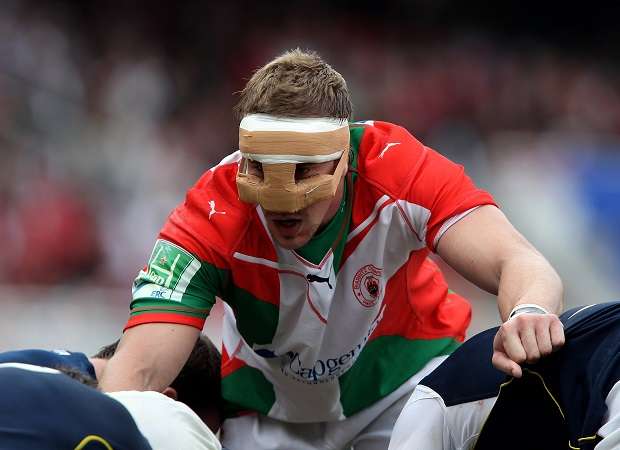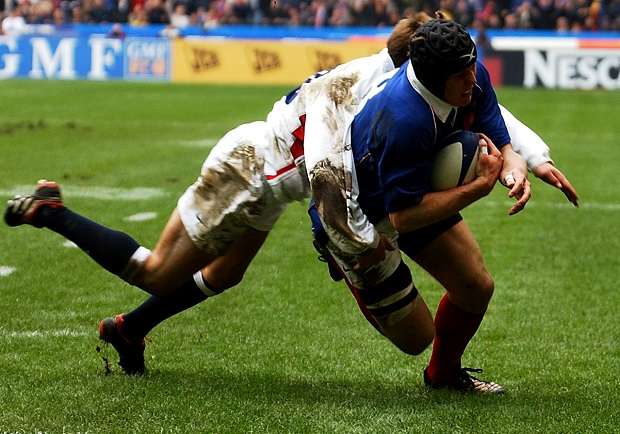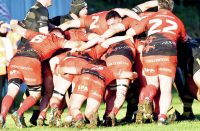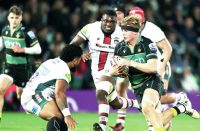 So it’s farewell to Imanol Harinordoquy who will be an ex-rugby player by the end of the month, perhaps sooner. His name still manages to defeat many commentators despite a stellar 16-year career and almost weekly appearances on our TV screens but luckily – rather like Gareth or Gerald, Jonny or Richie – his stature as a player was such that we quickly knew him on first name terms.
So it’s farewell to Imanol Harinordoquy who will be an ex-rugby player by the end of the month, perhaps sooner. His name still manages to defeat many commentators despite a stellar 16-year career and almost weekly appearances on our TV screens but luckily – rather like Gareth or Gerald, Jonny or Richie – his stature as a player was such that we quickly knew him on first name terms.
Imanol is possibly my favourite French player of the modern era, yet objectively he will end his career with a couple of frustrating omissions from his palmares. Biarritz may have ground their way to a couple of French Championships on his watch but they could never deliver when it counted in the Heineken Cup and although he can reflect on three Grand Slams with France, his three World Cups yielded two fourth places and a runners up spot.
But as he runs down the clock at Toulouse with very occasional appearances – and who knows they could yet challenge in the T14 play-offs although don’t hold your breath – it is nonetheless worth reflecting on a remarkable, singular and sometimes misunderstood player and individual.
Early in his Test career Imanol called the English “arrogant and chauvinistic” at a pre-match Press conference which promptly earned him the reputation of being the French Brian Moore but in truth he is no more anti-English than the claret drinking, cassoulet devouring, cheese-loving Moore is anti-French.
In fact the Imanol I’ve known a little and reported on throughout his career is something of secret Anglophile, a veteran of ubiquitous French school trips here and a linguist – if you can talk Basque you can cope with any language – with a very passable grasp and liking of the English language although he sometimes hid that fact. For the record he never missed an England game, no matter how injured or out of sorts and appeared in 14 in total, finishing with a record of six wins and eight losses.
And what he said on that occasion, before the 2003 Six Nations match when he was outstanding in defeat for France, was only what any proud Basque utters occasionally about the French and Spanish as well, let alone the English.
A small ‘nation’ and marginalised people, the Basques are deeply suspicious of overbearing power, manifestations of arrogance and those who stack the odds in their favour to suppress others. A hint of bullying and hypocrisy and heckles rise. And, let’s be honest, there was a hint of that about England in their pomp, circa 2003, where every opponent was there to be crushed.
His comments came barely a week after I had visited him for a convivial lunch which slipped effortlessly into an unscheduled dinner as well as we toured the bars and restaurants of his home town St Jean Pied de Port – better known as Garazi by its Basque inhabitants – five miles from the Spanish border. A hamstring strain conveniently meant he was enjoying a few down days.
It was lashing with icy rain – not unknown in those parts in January – but he insisted on doing the honours with a massive umbrella as we toured his favourite watering holes and embarked on elaborate introductions regarding “le journaliste anglais” as bar tender friends poured a Segardo– a lethal Basque cider – or measured out a generous shot of Patxaran, the local firewater which involves soaking sloes anisette and is said to ward off chills and damp.
On that occasion he had expressed a fair bit of admiration for the England team so when I bumped into him next, after France’s game against Scotland that season, I quizzed Imanol on his reported ‘outburst’. He winked and then shrugged his shoulders with amusement. “It is sport. It is okay for England players and reporters to say things about us – crazy French, violent French, mad French – and we are expected always to turn the cheek?
“When somebody answers back they complain but it is all part of the game. Are we the French not allowed to play this game sometimes?” I rather fancy he had a point. People in glass houses should not throw stones, or at least not get sniffy when others occasionally lob stones back.
Being a Basque explains just about everything you need to know about Imanol. It’s where he comes from geographically and figuratively. Politically he has never been fervent – he has always disowned ETA – but culturally he is devout Basque.
Garazi is the old capital of the historic Basque province of Navarre. He was named after a famous Basque singer and comedian and as a teenager he was an outstanding pelota player for a big guy. One of his enduring friendships from is with former world pelota champion Mattin Celan who also used to play scrum-half to his No.8 in school and Garazi junior teams. Imanol’s father Lucien was a noted local athlete and rugby player and tipped to be the next legendary Basque player before injury.
 Except when on France duty running the bulls in Pamplona at the Fiesta de San Fermin every July has always been Imanol’s main summer indulgence although these days, what with his chronically bad knees, trout fishing in the Petite Navarre has more appeal.
Except when on France duty running the bulls in Pamplona at the Fiesta de San Fermin every July has always been Imanol’s main summer indulgence although these days, what with his chronically bad knees, trout fishing in the Petite Navarre has more appeal.
Just as a good Cornishman can be a proud Englishman Harinordoquy’s loyalty to France is unquestioned but he always stood slightly apart. There have been very few true Basques in the French team in recent years, he has been the sole flag bearer.
Although he eventually won 82 caps I always felt successive France coaches were rather suspicious of Imanol and his talent and there was another even more elevated level he could have reached in a more conducive environment. There was more than a touch of Sergio Parisse about Imanol’s all-round game but throughout much of his 11-year international career such exuberance was actively discouraged. More’s the pity.
His exceptional skillset as a forward – handling and running skills as well as old fashioned grunt – belonged more to the French sides of the Seventies and Eighties than the grindingly efficient and utilitarian sides we saw under Bernard Laporte and Marc Lievremont.
In those early days he was obvious captaincy material – he had successfully captained the French Schools and France U21 – but strangely that never happened. He wasn’t close to either Laporte or Lievremont which didn’t help and possibly there was also a lingering antipathy to such a prominent high profile Basque captaining Les Blues.
Perhaps he was considered too much of a loose cannon while his club Biarritz – where he moved after making his name at Pau – were considered outside the mainstream. Even Thierry Dusautoir was only capped and made captain after his move from Biarritz to Toulouse.
Yet when you watched a France match it was invariably Imanol who gathered the pack round in times of crisis or barked the final instructions before the match in one final huddle.
In New Zealand at RWC2011, when France were an utter shambles for most of the tournament, it was Imanol at the heart of the palace revolution of senior players during that final fortnight in Auckland. With Imanol in the vanguard they effectively took over the team and salvaged a quarter-final win over England and a semi-final victory over Wales before France lost a final most neutrals agree they should have won.
He was some player when the force was with him, which was most the time but not always. In my estimation Imanol’s only real weakness was that he did very occasionally suffer what the French cycling fraternity call a jours sans – literally a “day without” when for whatever reason – nerves, fatigue, temperament, disillusionment with the coach or game plan – the tank looked empty and the spirit visibly flagged.
Mostly though he was imperious and as a lineout forward Imanol was, in his own versatile and eccentric way, the best I’ve ever seen ranking alongside the more orthodox Victor Matfield.
Before rugby took over, Imanol was tipped for a career as a basketball professional and never lost that spring-heeled jump that saw him, just 6ft 3in, consistently duke it over much taller lineout forwards. Right from the off, his debut in Cardiff in 2002, he became France’s go-to lineout forward, highly unusual for a back-row forward.
Although he preferred operating at the tail of the lineout Imanol happily and frequently switched to two and four when required and much of the time relied purely on his standing jump to beat opponents. As his teammates got used to his eccentricities one or two did start flicking him skywards, a sort of assisted take off, but in truth little more was required.
Projecting Imanol skywards was not heavy duty work, indeed the piano lifters in the French pack were virtually redundant.
The great glory though of Imanol’s lineout work was his extraordinary one hand catches and takes, either inside or outside hand. He is the first lineout jumper to make this the norm, his modus operandi rather than the exception, a last resort if things went wrong.
He didn’t use them all the time but they were a joy to watch when unveiled, especially when the introduction of super slo-mo cameras – pioneered by French TV – started to highlight what was really going on at the lineouts. The stills snappers also loved him. If you were minded to compile an all-time top ten images of lineout leaps and takes – and there’s an idea for a quiet day – I would suggest three of four at least would feature Imanol.
He made it into an art form but there was science in his method as well. French rugby was a jungle when he graduated into the Pau team at 18 in 1999 and in those poorly policed lineouts it was extremely useful, as well as novel, if you had the ability to catch the ball one-handed.
That meant you could beat off those trying to climb all over you with your other arm. They would be busy trying to hook – illegally but generally unpunished – one arm accidentally on purpose and while they were doing that Imanol caught it with the other.
Imanol should have patented the manoeuvre because nowadays you see it all the time. One-handed take and quick one-handed transference to the support player binding on while using the other hand to fend off opposition players trying to swarm round. That was Imanol who started that.
That’s his legacy to world rugby.























